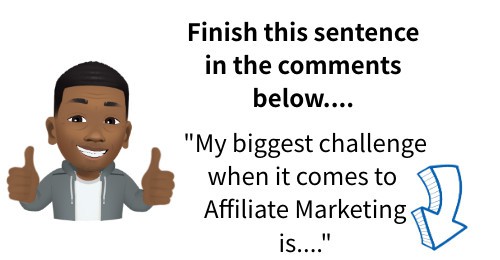If you’re a new or an experienced affiliate marketer, First Click Vs Last Click Tracking and attribution is something you ought to know about.
Before promoting any affiliate product, you need to be sure you’re crystal clear about exactly how your affiliate clicks and sales are being tracked.
Most affiliate links are tracked using cookies.
What Is An Affiliate Tracking Cookie?
Affiliate tracking cookies are a unique type of cookie that is used to track the activity of affiliates.
Affiliates typically have a unique ID code called an affiliate ID which is matched with their online activities.
This allows companies and advertisers to know when someone has clicked on their advertisement, or visited their website from an affiliate link and exactly which affiliate to pay.
It also helps them determine how much money they can pay out for conversions in order to maximize profits.
These are usually tracked on a first click or last click commission attribution basis.
Neither is necessarily good or bad.
It depends on your methods of promotion whether first or last click tracking is going to be a problem or not.
I always personally make sure affiliate links are being tracked on a last click basis.
In this blog post, I’ll be talking specifically about “First Click” and “Last Click” Affiliate link attribution models.
Here’s the difference between First Click and Last Click tracking…
What Is ‘First Click’?
First click means exactly that.
It’s FIRST click.
If your link was the FIRST link a visitor clicks and they buy the affiliate product you are promoting, you’ll get the commission.
If it wasn’t, you won’t.
Scenario 1:
George is searching the Internet for a Camping Tent. He’s browsed several websites, but hasn’t clicked any links. He comes across Jonny’s blog who has provided an in depth analysis of a luxury tent, George clicks Jonny’s affiliate link and buys the tent, Jonny gets the commission.
Scenario 2:
Malcolm is also searching for a Camping Tent, he visits Paul’s website which reviews the same luxury Camping Tent he clicks the affiliate link but does NOT buy the tent, he keeps browsing and arrives at Jonny’s website which reviews the same Tent, this time Malcolm clicks the affiliate and BUYS the tent, however the commission goes to Paul because Paul’s affiliate link was the first affiliate link Malcolm clicked.
So even though Jonny effectively made the affiliate sale, Paul will get the commission.
So as you can see in both scenarios, it can work for you or against you.
So you need to be careful.
What Is Last Click?
Last click is my preference.
Generally speaking, I will only choose to promote programs that track & credit commissions on a ‘last click’ basis.
There are instances where I might promote on a first click basis, but it’s rare and I’ll get to that in just a moment, but first I want to tell you exactly what ‘Last Click’ commission tracking means.
‘Last Click’ commission is when the last affiliate link a visitor clicks, gets the commission.
So if “Bob” visits Tom, Peter and Brian’s blog and clicks Tom & Peter’s links but doesn’t buy and then clicks Brian’s link and buys, Brian will get the sale because he sent the last click.
What this means for you is, if somebody clicks your affiliate link AND buys, you’ll get the commission regardless of any other affiliate links clicked before yours.
Should You Choose First or Last Click Commissions?
Wherever possible, in fact, in every instance you should only promote products on a last click commission basis.
This means that if you sent the referring click and the customer buys, you’ll get paid.
How many other affiliate links the visitor has clicked before clicking yours is irrelevant.
You’ll still be paid, if they buy the affiliate product as a direct result of clicking your affiliate link.
The Only Instance Where I’d Choose a First Click Commission Attribution Model
The one and only time I’d be prepared to promote an affiliate product on a ‘First click’ commission basis, is for a NEW product launch.
Supposing I had ‘insider’ information about a new product being launched and I knew well ahead of the launch, I might choose a first click commission basis.
The reason for this is, if you know of the launch well in advance, you can set up an affiliate site, so that you’re ready for when the product actually launches and if your link is the first link that get’s clicked when everybody’s in a frenzy to buy the thing, you’ll get the commission.
It’s also an extremely powerful strategy if you already have an email list.
You could send them your affiliate links well in advance so that they are tracked back to YOU, even if they click & buy from somebody else’s link.
And when the product eventually launches and they buy the product, you’ll get credited with the sale.
So as you can see both ‘First click’ and ‘Last Click’ attribution models can work well in very different scenario’s, but where possible, I would always choose ‘Last click’ commission attribution as my preference.
